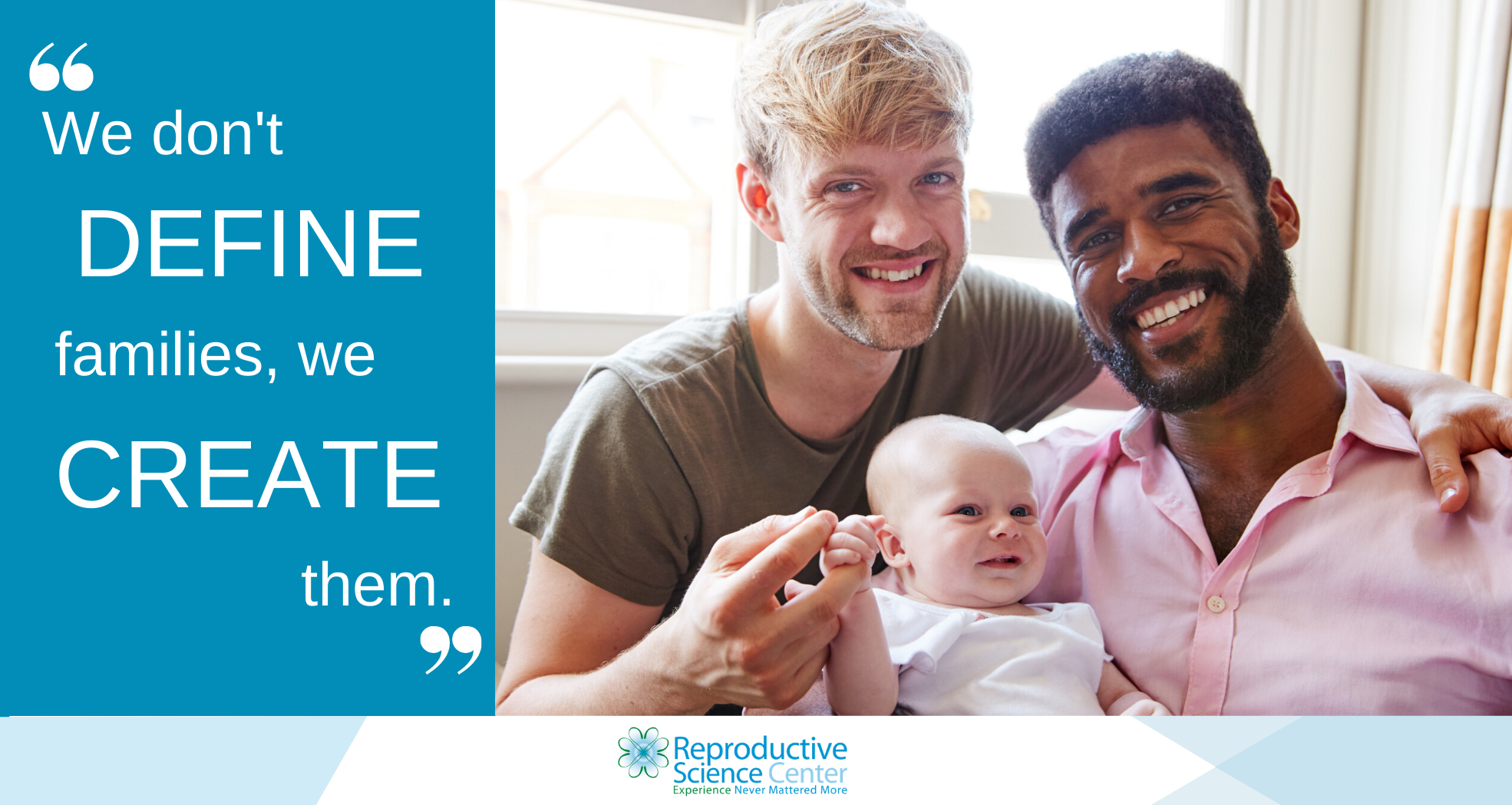Reproductive Science Center of the San Francisco Bay Area (RSC) is committed to helping members of the LGBTQIA community who desire fertility preservation or family building services. Success depends on various factors, including the health and fertility of those providing the sperm and eggs and carrying the pregnancy, as well as the experience and skill of the physicians and embryologists overseeing the procedures.
The fertility services LGBTQIA individuals and couples need to have a family are often the same infertility treatments we have had years of experience providing at RSC – both for LGBTQIA and heterosexual people. Below are the treatments and solutions we provide that can help anyone have children of their own.
Topic guide
Donor sperm
Egg donor
Gestational carrier
Intrauterine insemination
In vitro fertilization
Additional information

Breaking Barriers, Building Families
Since 1983, we have pioneered fertility treatment for every kind of family. We want to help you achieve your dream of having a baby.
Request appointmentDonor sperm
A sperm donor may either be known or chosen from a sperm bank, such as Fairfax Cryobank. We have referrals for a number of sperm banks that are approved by the U.S. Food and Drug Administration (FDA). In both instances, the donor is tested and screened for infectious diseases. Sperm donors can be anonymous or someone known by the recipient.
A known sperm donor can come to our San Ramon office for the screening and testing process and will provide a semen sample for freezing. In some cases, we may have the donor return to provide additional samples within the following week. A donor from a sperm bank will already have completed screening and testing prior to being listed on that cryobank’s website.
Being with my partner, and being able to have kids is the greatest thing ever. We have been together for five years. So we decided that we wanted to have a baby together. So I (Shannon) got artificially inseminated, and we had twins! A baby boy and a baby girl. The perfect family! I feel that my life is complete, there is nothing else I could want more.
Shannon and Lena
Egg donor
An egg donor also may be known or anonymous. RSC maintains a number of egg donors from a pool of screened, racially diverse, anonymous donors. We can also direct patients to a number of egg donor agencies, with access to donors available for fresh cycles as well as frozen egg transfers if that is preferred.
Our very experienced donor coordinators can help determine which of these options is best for each patient. All donors, known or anonymous, must be screened and tested as mandated by the FDA. Donor testing may be done in our San Ramon, San Mateo or Oakland office.
Gestational carrier (surrogate)
A gestational carrier (a type of surrogate) is a woman who will carry the pregnancy for the intended parent(s) but has no genetic relationship to the baby. This woman’s egg is not used to create the pregnancy.
Gestational carriers go through screening and testing including review of her pregnancy and delivery history. The gestational carrier (also her partner if applicable) and the LGBTQIA couple or individual will meet with a counselor to discuss topics that are not clinical or legal in nature. Many agencies specialize in matching couples with a gestational carrier; we can provide several options if needed.
Legal consideration
Separate legal representation is required for patients and the gestational carrier. An attorney will set up an account for compensation for the gestational carrier, and is responsible for ensuring that medical insurance has been arranged for the gestational carrier.
The attorney also ensures that all parties are aware of issues that may arise and facilitates discussions related to how these may be resolved. We can provide referrals for attorneys who specialize in LGBTQIA family building or third-party parenting.
Intrauterine insemination (IUI)
This treatment, in which donor sperm is inserted into the prospective parent’s uterus and then carries the pregnancy, is utilized by individuals or couples in which at least one partner has a uterus. For couples, IUI involves one partner being the “active” patient, the other being the supportive one. Some testing will be required to evaluate the ability of the active partner’s ovaries to produce eggs and the ability of the uterus to support a pregnancy. Occasionally, an HSG (hysterosalpingogram) X-ray may be recommended.
If all of the testing is satisfactory, an IUI cycle is a good option. The treatment cycle may include monitoring of the individual’s natural cycle, oral or injectable medications, blood tests and ultrasounds. The IUI procedure uses sperm prepped in the lab and drawn up into a syringe. A thin catheter is attached, and this is passed through the cervix into the uterus where the sperm are gently injected.
Fertility treatment in general, and third party parenting especially, can affect how you see yourself, your sexual relations, your primary relationship, your relationships with family, friends, and your extended community. RSC will guide you to qualified therapists who understand this new terrain and can gently guide you toward more comfort, understanding and communication throughout the journey.
In vitro fertilization (IVF)
IVF, when both partners in a couple have either ovaries, a uterus or both, may involve one or both partners as “active” patients. Reciprocal IVF involves both partners. One partner has eggs retrieved from the ovaries and the eggs are inseminated with donor sperm. A resulting embryo can then be transferred to the second partner’s uterus who will carry the pregnancy.
Intended parents without uteruses utilizing a gestational carrier may also use IVF.
Any additional embryos may be frozen for use at a later time. If only one partner is the “active” patient, that person will go through the IVF process, providing the eggs and having an embryo transferred into the uterus.
Sperm provider for IVF
For LGTBQ+ couples where one or both partners have sperm, one or both partners can provide sperm to inseminate the eggs. The sperm provider(s) will undergo FDA mandated screening and testing. This can be done in our San Ramon office and involves a physical exam, blood work and completion of a health screening questionnaire. In addition, the sperm provider(s) will produce a semen sample to be frozen for use in the actual treatment cycle.
Transgender parents
RSC acknowledges the spectrum of gender identities that exist in the transgender and/or gender nonconforming LGBTQIA community. When it comes to family building, this means that each individual or couple may have different reproductive needs.
Additional information
We highly recommend legal counsel prior to initiating treatment. Laws regarding alternative family building may change and legal counsel can help. We can provide referrals for attorneys who specialize in family building or third-party parenting.
For more information about third-party family building for gay couples, read Donor Concierge’s Men’s Guide to Making Babies.
